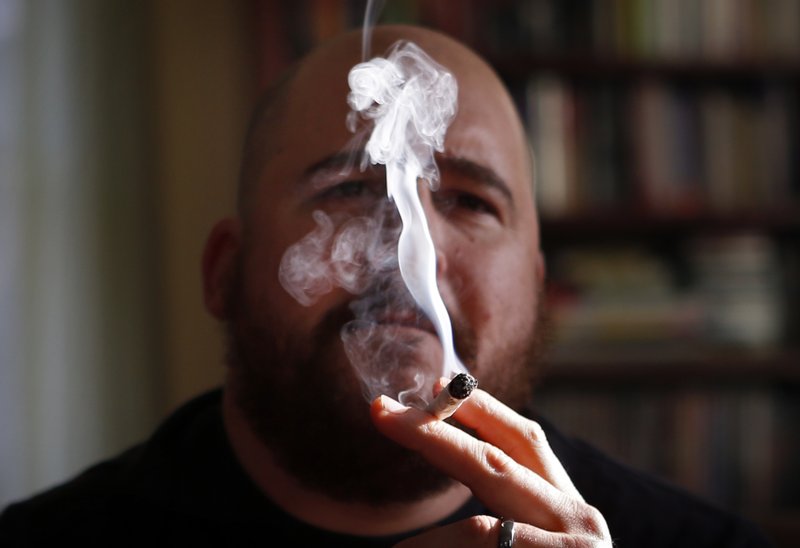PORTLAND, Maine -- A handful of recreational marijuana legalization drives has the medical marijuana industry bracing for something it thus far hasn't had to deal with: competition.
Recreational legalization is on the ballot in five states this November, and all five currently allow some form of medical marijuana already. Medical marijuana is on the ballot in four states, including Arkansas.
Growers, medical professionals and users of medical marijuana say they worry that people who want medical marijuana will buy it on the open market instead of going through the hassle of getting a doctor's recommendation.
"This is being structured for big corporations to come in and in a very short period of time wipe out the caregivers," said Lori Libbey, a board director of a Maine group campaigning against legalization. She is also a nurse who administers cannabis. "I wonder who is going to be able to provide for pediatric patients."
But some proponents of recreational marijuana believe medical marijuana professionals just don't want to lose their monopoly.
Recreational legalization measures are also on ballots in Arizona, California, Massachusetts and Nevada. Concerns from medical marijuana professionals have also cropped up in those states, and they have echoed similar struggles in states that have already legalized recreational marijuana, such as Oregon and Colorado.
Competition in the marijuana market has become part of the landscape in Colorado, which saw nearly $1 billion in sales of medical and recreational marijuana last year. The state went legal in 2012.
Paul Armentano, spokesman for the National Organization for the Reform of Marijuana Laws, said some medical users and advocacy groups worry about corporatization of marijuana as the market expands. Tension between medical and recreational marijuana supporters, he said, has already become an issue in California.
The marijuana legalization group is sensitive to the concerns of medical marijuana users, Armentano said, but also understands that some of the consternation is about angst over free-market competition.
"There is a concern among individuals who largely have the marijuana market solely to themselves that the advent of broader legalization will introduce competition into the existing market and that competition will pose a threat to their existing business model," he said.
Advocates of medical marijuana said they believe that state regulations are the key to making sure medical marijuana survives in the age of legalized recreational marijuana.
In Massachusetts, the language has alarmed critics who fear passage of the ballot question could compromise or perhaps even overrun the state's medical marijuana program, which has already been slowed by regulatory delays since voters authorized it in 2012.
Nichole Snow, executive director of the Massachusetts Patient Advocacy Alliance, said her group, which supports medical marijuana recipients, is neutral on the ballot question and uncertain of its potential impact.
"I hope there is still patient focus [if] this initiative passes," Snow said.
Americans for Safe Access, an organization that advocates for legal access to medical cannabis, said recreational marijuana programs should be kept separate from medical marijuana.
The group sees potential "competing interests" between the two if they are co-mingled, said Beth Collins, a leader of the organization. The group also sees potential harm from the possible corporatization of marijuana, Collins said.
"On the negative side, big business may try to impose regulations to keep other players out, which could lead to fewer products," she said. "The best medical cannabis programs allow for both large and small businesses along with access via patient or caregiver cultivation."
Some ardent proponents of medical marijuana are on board with broad legalization.
Carey Clark, a member of the board of directors for the Oregon-based American Cannabis Nurses Association, said recreational legalization will allow people who use marijuana as medicine to have easier access to it.
"When it's legal we're going to see an increase in quality and a decrease in cost, and that is really good for people who need access to this medicine," Clark said. "Things will be labeled and they'll know what they're getting."
Meanwhile, a store in Alaska became the first in the state to sell retail marijuana, with its Saturday grand opening dubbed "high noon" by the store's operators.
The opening of Herbal Outfitters in Valdez came nearly two years after voters approved allowing people 21 and older to recreationally use marijuana.
Herbal Outfitters' offerings mark the first time it's legal to buy marijuana under the voter initiative approved in November 2014. Passage of the measure made it legal under state law to possess up to an ounce of marijuana outside of a home.
The Valdez opening came less than a week after the opening of the state's first testing lab, CannTest, in Anchorage. The testing business opened Monday after clearing regulatory hurdles days earlier. It will test cannabis flowers, edibles and concentrates.
Herbal Outfitters' general manager, Derek Morris, said the store will initially carry only dried cannabis flowers. He said manufacturers of edibles and concentrates are still in various stages of the permitting process.
Information for this article was contributed by Bob Salsberg and staff members of The Associated Press.
A Section on 10/30/2016

